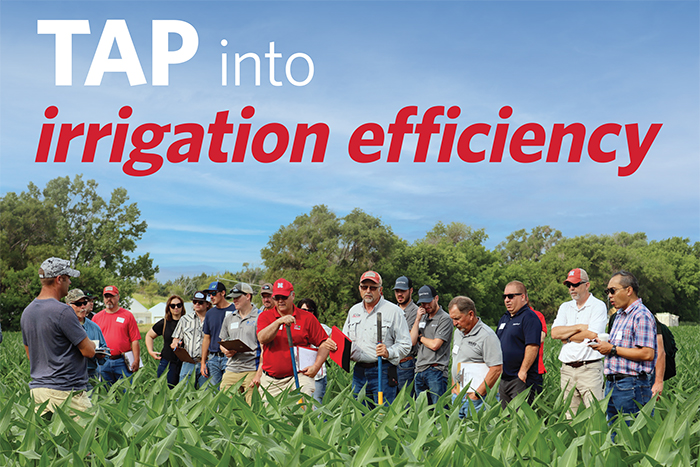
When the Testing Ag Performance Solutions program launched five years ago, the goal was to offer new ways to engage producers. TAPS uses a unique farm management competition to drive learning about how to maximize profitability and efficiency. The program’s innovative and fun approach lets producers try new irrigation management tools and strategies while engaging with and learning from their peers and many other key production agriculture stakeholders.
The competition was developed by a group of University of Nebraska-Lincoln educators and local partners, including producers. “TAPS started with the idea that UNL, producers and private industry could work together to address issues of farm profitability, water quantity and water quality,” says Chuck Burr, UNL water and integrated cropping systems extension educator and TAPS team member.
Unlike a common yield contest, TAPS teams compete for three awards with the highest honor being awarded to the most profitable team, followed by the team that demonstrates highest water and nitrogen use efficiency. A third prize is for greatest grain yield, with the size of that prize adjusted based on the team’s profitability.
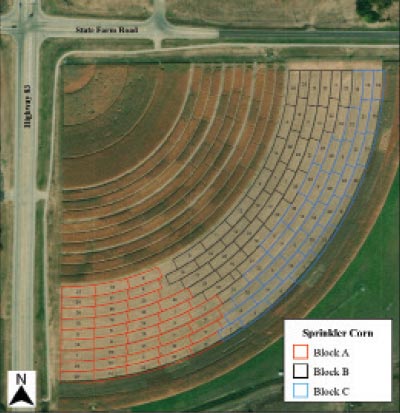
Participants are responsible for making input decisions throughout the growing season using an online portal. Each team’s decisions are implemented in the same field on three randomized plots. The decisions they control include hybrid selection and seeding rate, nitrogen fertilizer management, irrigation, insurance selection and marketing strategy.
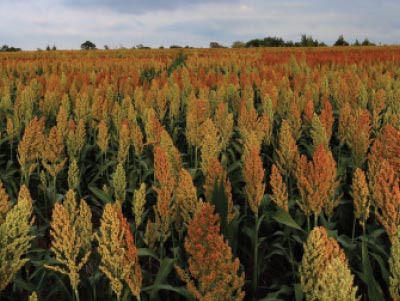
Partnerships with several ag technology providers let competitors test how new and emerging technologies such as sensors and imagery can aid their decision-making process in real time. Participants get to try out these tools in a low-risk manner and evaluate their utility for their own operations, while giving the companies opportunities to glean insights from a captive audience about how their tools perform.
In the 2020 Sprinkler Corn Competition, participants applied from 1.26 to 16.76 inches of water. “With that wide of a range, participants learn very quickly to rely more on available technology, such as soil moisture probes, imagery and weather data, to make more efficient irrigation decisions,” Burr comments.
Widespread support from commodity boards, ag service providers, regulatory agencies, financial institutions and U.S. Department of Agriculture agencies over the past five years has allowed the program to expand its competitive offerings. TAPS started with just a sprinkler irrigated corn competition housed at UNL’s West Central Research, Extension and Education Center in North Platte, Nebraska.
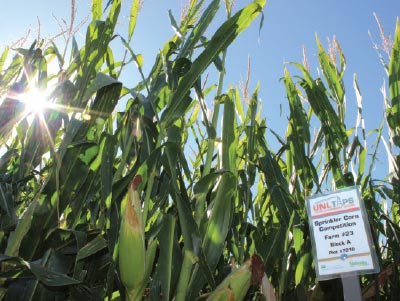
The program has since grown to add a sorghum competition as well as a subsurface drip irrigated corn competition at the North Platte location. The High Plains Ag Lab near Sidney, Nebraska, now also manages a dryland wheat competition. Oklahoma State University has also worked closely with the UNL group to start an OSU-TAPS program that offers competitions in corn and cotton at the McCaull Research and Demonstration Farm located near Eva in the Oklahoma Panhandle.
Competitors hail from throughout Nebraska and neighboring states, bringing together a wide range of skills and experience, which makes participating in TAPS a learning experience for everyone involved.
The winner of the Most Profitable award, which is the highest honor, is the simple calculation of total revenue minus total expenses. All farms in the competitions have the same production cost for all nondecision cost factors (e.g., land costs, machinery costs). Each team has access to their unique budget through the website, which is updated as management decisions are finalized. Each input has a listed price or per unit cost, depending on the type. The costs for variable inputs (e.g., fertilizer, irrigation, drying costs) are based on actual use or yields.
Partnerships with several ag technology providers let competitors test how new and emerging technologies such as sensors and imagery can aid their decision-making process in real time.
The winner of the Highest Input Use Efficiency award is determined using the Water-Nitrogen Intensification Performance Index (WNIPI, Lo et al., 2019). The WNIPI compares the effect of nitrogen and irrigation input on grain yield with respect to a set of three “control” treatment plots in the field that are managed by UNL that receive no irrigation or N fertilizer aside from 10-34-0 at planting. Other aspects that are analyzed as part of calculating this index value include seasonal evapotranspiration, seasonal irrigation, total seasonal applied nitrogen and aboveground nitrogen uptake. The farm with the highest value is determined the winner.

“The interesting and exciting thing to me is that the top efficiency team has been in the top two in terms of overall yield, showing that you don’t have to give up yield to be efficient,” Burr notes.
The organizers of the program are finding that some participants are taking the lessons they learned back to their own operations or investing in new technology after using it during their time in TAPS.

“Since joining the TAPS program we have applied 60 less pounds of nitrogen on our pivots without seeing a drop in yield. We put a lot more nitrogen through the pivots instead of putting it all out up front,” says Brian Ballou, TAPS contestant. “We are hoping to get our nitrogen usage rate down even further in the years to come.”
Other participants are using the program to benchmark their managerial skills against those of their peers, competing on the same field rather than comparing their crops to their neighbors’ where conditions such as soil, weather and water availability may vary.
Collegiate teams, high school ag instructors and government agencies are using the experience as an educational mechanism.
No matter what expectations participants have when joining the program, the impact TAPS is having on producer practices, knowledge level and experience is both measurable and immeasurable.
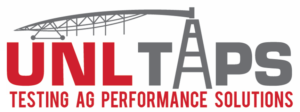 The program’s innovative and fun approach lets producers try new irrigation management tools and strategies while engaging and learning with and from their peers and many other key production agriculture stakeholders.
The program’s innovative and fun approach lets producers try new irrigation management tools and strategies while engaging and learning with and from their peers and many other key production agriculture stakeholders.
8280 Willow Oaks Corporate Drive | Suite 630 | Fairfax, VA 22031
Tel: 703.536.7080 | Fax: 703.536.7019
HOME | ABOUT US | ADVERTISE | SUBSCRIBE | CONTACT | PRIVACY POLICY | IA ANTITRUST STATEMENT